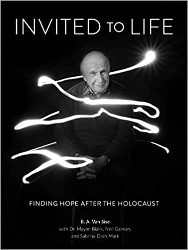
As a child, I was drawn to an old sepia-toned photograph taken in Russia (an area of present-day Ukraine) that stood proudly on my great-grandmother’s shelf. The image of my beautiful ancestor holding up my infant grandmother ignited within me a lifelong desire to learn every detail of their past.
Soon after, with the publication of Alex Haley’s Roots in the mid-1970’s, interest in family history research soared. Ever since, the Jewish community has been enamored with the idea of discovering their roots. As a young girl during this time, Haley’s work inspired me to tape record my grandmother Channa’s bedtime stories. When I couldn’t sleep, she drew on stories from her own youth, detailing a harrowing account of survival during the pogroms. I was hooked on documenting the past.
Four and a half decades of Jewish genealogical research came to a high point for me this past year, in two big ways. One was the publication of my book, Tears Over Russia: A Search for Family and the Legacy of Ukraine’s Pogroms (Pegasus Books, June 2022). I finally finished what I set out to do — I recorded my grandmother and her family’s story of survival. I then coupled it with archival research about a little-known genocide in Jewish history-the pogroms in Ukraine in 1917 – 1921.
My second accomplishment — perhaps almost as dear to me as my book — was helping Bernard “Bolek” Krutz, a Holocaust survivor, discover the family he was born into by using genealogical skills that I acquired over a lifetime. Bernard was a hidden child survivor from Poland who knew nothing of his birth family. Now in his early eighties, he can say, with certainty, that he is a part of a once large, thriving Jewish family from Lodz. Sadly, almost all perished in the Holocaust.
Even more important to Bernard was the recent discovery of and emotional meeting in Israel with his first cousin, the only biological family member he has ever met, aside from his offspring.
The miraculous reunion between Mr. Krutz and his cousin made international news back in November 2021, but only one outlet called to interview me about my genealogical sleuthing behind the reunion.
When younger and older family members work together in search of the past, a special bond and connection is formed.
The next day, over one-hundred emails and messages flooded my inbox. Almost every person was interested in discovering their Jewish roots, or wanted guidance on how to solve a family mystery.
“Where do I begin?” they all asked.
My answer: start with what and whom you know. Whether you are a teenager or a grandparent, begin researching and recording now; it’s never too late. If you are a younger person, reach out to older family members — and not just your parents and grandparents. Don’t overlook their siblings or cousins from the older generations.
When younger and older family members work together in search of the past, a special bond and connection is formed; sometimes the interest will also reunite wings of a family distanced by the passage of time.
Anyone — even a widow of an older family member or a child of someone who kept everything — could be sitting on old family photos or records. Don’t be afraid to reach out and ask for copies. You know what I am talking about — those photos we all have with the Yiddish writing on back and documents in other languages that people don’t quite know what to do with; they often end up sitting in a box in the attic.
As a girl, long before the Internet, I wrote letters to elderly family members. Two ladies sent me packages filled with genealogical treasures. One mailed me pieces of what I would later discover was my ancestor’s Russian passport from 1904.
If you are the older member of your family, write down whatever family stories you remember — even rumors might have a kernel of truth behind them. Who was your oldest ancestor to step foot on North American soil? There will be some type of record on that person, waiting to be found. Passenger records will reveal where your ancestors traveled from. Marriage and death certificates are likely to reveal the names of their parents. Social security applications, military draft records, and historical newspaper articles can add to the narrative.
Take photos of the Hebrew on the gravestones of your family members — Jews will often inscribe the name of the decedent’s father on a headstone.
There are numerous sites that you can join (some free, others by subscription) that can be invaluable in your search. Jewishgen.org has a family finder where you can contact other researchers interested in your surnames or towns. The Yizkor Book Project on their site (Holocaust Memorial Books) can be an invaluable tool. Ancestry.com has the US census as well as other vital records.
On Yad Vashem’s website, there is a Shoah names database. Many survivors and family members submitted Pages of Testimonies on those murdered, which often included invaluable genealogical information. I used dozens of these testimonies when creating a family tree for Bernard based on a memory that he had of a surname; it turned out to be his own.
DNA tests have become popular. Ancestry DNA is my favorite to work with, as it will show (with a subscription) the family trees of your DNA matches. This was another tool that I used — with much success — to help reconnect Bernard with the cousin that he never knew. It can also help you reconnect with relatives whom you’ve lost touch with, or to introduce you to new ones who might already be sitting on an arsenal of family documents, or, even better, an existing family tree.
While researching Tears Over Russia, I joined many free Jewish genealogy groups on Facebook, and shared information with other researchers studying my grandmother’s shtetl. Jewish families have migrated all over the world, but interest in our shared roots keeps our research community connected.
It is never too late to start digging into your own roots — so get started. I can admit now that back in 1972, at the age of nine, I was the one who took that intriguing ancestral photo off of my great-grandmother’s shelf after she died and chased history. Now, a half century later, it graces the cover of my book.
Lisa Brahin is an accomplished Jewish genealogist and researcher from New Jersey. A graduate of George Washington University’s Columbian College, she is a two-town project coordinator for Jewishgen.org’s Yizkor Book Project (Holocaust Memorial Book Project). Lisa hopes that her book, Tears Over Russia: A Search for Family and the Legacy of Ukraine’s Pogroms, will inspire continued interest in family history research. She also hopes that it will shine a light on an underrepresented period of Jewish history — the 1917 – 1921 pogroms in Ukraine — that prefigured the horror that was to come. Lisa Brahin is a Jewish genealogist and a JBC author. Invite her to speak virtually at your event on the JBC Authors Network Tour 2022 – 2023, and learn how to uncover the secrets of your family’s past.



